The Mainstream Media Needs to Do Better
They did it with Hillary and Trump; now they’re doing it with Israel and Hamas.

I’m a skeptic and a radical questioner of “received wisdom” by nature and by training (doctorate in philosophy, if you can believe it.) I’m not easily taken in by politically motivated disinformation, distorted “branding” or groupthink in the interests of proclaiming ones own “progressive” virtues. Nor am I a cheerleader for anything and everything Israel has done or is doing.
I’m like a lot of secular American Jews who are the children of immigrants: I grew up with a lot of “embodied” Jewishness but no identification with Israel. I have far more knowledge of the Holocaust (and far more knowledge of Yiddish swear words and how to make great matzoh balls) than Israeli history. But as the Israel/Hamas war has gone on, I’m feeling more and more identified with Israel. (Do I really need to say: NOT Netanyahu, but ISRAEL. You’d think people would “get”—having been told numerous times—that they are no more the same than the “United States” equals “Trump”. But people don’t get it.)
In part, my increasing identification has come from learning more about the history of the region. In larger part, it’s been fired up by the anti-Semitism that’s been leaking out of the swamp in which it’s been (barely) hiding without a “cause” to attach itself to. But perhaps the largest part of my identification comes from my increasing anger over how quick and without reservation non-Jews (particularly those who identify themselves as “progressive”) are to argue with me, to accuse me of monstrous callousness over the plight of Palestinian civilians, to show none of the respect for history or personal experience that the same people afford virtually any other ethnic or racial group. We rarely are even granted the (perhaps fake, but at least polite) deference of “I know how you must feel” before they launch into attacks. Then, if challenged, they trot out the self-justifying innocence of “Isn’t it ok to criticize Israel without being accused of anti-Semitism?” As though this were some kind of seminar discussion.
You don’t seem to understand that you don’t get to tell me what’s anti-semitic and not. Would you dare instruct a Black person about what’s racist and what’s not? And it’s my relatives you’re attacking. My people. My ancestors. My grandmother who never spoke anything but Yiddish. My mother and her brothers who came here, escaping the pogroms. My fiercely assimilationist father, who never went to shul but ripped his shirt when my mother died. The butcher who sold us kosher chickens and the people in the Brooklyn neighborhood where my Grandmother lived; every time an older Israeli speaks on television, I hear the exact same accent I heard throughout my childhood. My high school friends whose parents had actually been in the camps, and whose apartments were draped in mourning.
It’s not just the “progressive” “warriors” for “social justice” that make my blood (almost literally) boil. They are incorrigibly convinced of their own virtue, oblivious (as they were in 2015-16) to the real-world consequences of what they are doing, and may well lead us right into another Trump presidency. It’s also, as it was in 2015-16, MSNBC, CNN, The New York Times, The Washington Post, the BBC, etc. etc. etc. I may be a learner when it comes to the specifics of the Middle East. But I’m a maven when it comes to the media. I’ve spent most of my professional life writing and teaching about the representations that influence our understanding of the world. I’m convinced—and have the receipts to show—that without the mainstream media’s amplification (and in some cases, creation) of the scandals and brands they attached to Hillary Clinton (often taken straight from the pages of her various opponents’—including Putin’s—playbooks) she would have won in 2016. And the world would be very different today.
And they’re doing it again.
First of all, we need to recognize that we’re always dealing with stories. No news comes to us by way of bald facts. They are always encased in narratives. Sometimes those narratives are deliberately constructed to persuade, entertain, inflame. Other times, some narrative is “in the air,” surreptitiously setting the terms of what’s worth talking about and how it should be talked about. Still other times, overwhelmed by the urgencies of their jobs in a 24-hour news cycle, journalists get sloppy with their words, overlook crucial context, “rush to judgment.” And then, too, there are the unexamined, often unconscious biases that subtly or brazenly shape their narratives.
I could speculate on which of these (perhaps all) was operating when The New York Times virtually created Hillary Clinton’s “email scandal” or when Raf Sanchez, MSNBC’s man in Gaza, repeatedly ventured the opinion—even after the evidence that Israel wasn’t responsible was overwhelming—that “questions still remain” about the errant bomb that hit the parking lot of the al-Ahli Hospital in Gaza. I have my theories, which I’ve written about elsewhere, and which will inevitably leak out (as I’m sure they already have) and inspire denials, “What about”isms, and unvarnished attacks. But this piece only asks you to look at little more critically at what passes for “objective” reporting. And to consider the extreme damage it can do.
Liberal media mavens like to blame Fox for supplanting fact-based reporting with “alternative realities.” But although Fox has clearly been the abuser-in-chief, MSNBC, CNN, The New York Times, The Washington Post, and other “responsible” news outlets, while not as fast and loose with the facts, embed and garnish those facts—with words, images, headlines—that perpetuate some realities and “disappear” others. The words they use suggest how to see events. The images they choose to proliferate tell a story all on their own. Events that are headlined, dramatized, and repeated slyly segue into the category of believability, while those that are deemed less gripping slip into the purgatory of inattention. And if the chosen Big Story is ultimately proved groundless (as frequently happens) it’s easy to bury the retractions on page 10 (television reporters often just ignore their misreports.)
That’s exactly what happened when newspapers and news broadcasts throughout the world headlined “Palestinian” accusations that Israel was responsible for an attack on the al-Ahli Hospital on Oct. 17. I’ll get to the question of The Times (and many others) unquestioning acceptance of a report from one side of the war a bit later. For now, note how in just this one headline, a misleading narrative was being constructed. Citing the source as “Palestinians” immediately conjures notions that an indigenous ethnic group, a “people” are making the claim, when in fact the report came from the terrorist group Hamas. The image accompanying the headline is not of the hospital itself, which it would turn out was minimally damaged (the rocket hit the parking lot) but another building elsewhere, that had suffered total destruction.
When the Israeli government denied responsibility and suggested that a misfired Palestinian rocket had hit the site (which turned out to have been the case), reporters were clearly loathe to give that explanation serious consideration. Raf Sanchez of MSNBC, for example, while at first attributing any “confusion” to “an absolutely classic fog of war situation,” did not allow the fog to hold him back from presenting his own argument against what he described as Israel’s “counter-narrative”:
This kind of death toll is not what you normally associate with Palestinian rockets. These rockets are dangerous. They are deadly. They do not tend to kill hundreds of people in a single strike in the way that Israeli high explosives, especially these bunker buster bombs that are used to target these Hamas tunnels under Gaza city, do have the potential to kill hundreds of people.
He then went on to question Israel’s honesty (but not to question Hamas’s):
And we should say finally, that there are instances in the past where the Israeli military has said things in the immediate aftermath of an incident that have turned out not to be true in the long run. And the one example I'll give you is that when the Al Jazeera journalist, Shireen Abule was killed in the occupied West Bank, the Israeli military initially said that she was killed by Palestinian gunman. And it was only months and months later that they admitted that it was likely an Israeli soldier who fired the fatal shot.
I can’t begin to count the number of times Shireen Abule was produced to question Israel’s account of the hospital disaster. Did it happen? Yes. It is enough to put Israel’s reliability on a par with that of a terrorist organization that routinely employs disinformation as a PR tactic? I don’t think so. As for the “wrong kind of rocket” argument, it was pretty soon put to rest1, , but not before Raf and others offered it multiple times:
Nicolle Wallace, very reasonably, questioned Raf Sanchez about the sheer implausibility that Israel would have done something so stupid and self-destructive as to attempt a deliberate strike against Palestinian civilians seeking shelter in a hospital parking lot—an act with no military benefit and sure to dilute whatever sympathy the world had for the Israeli victims of October 7. But Raf ignored that question. So did Joy Reid, who later the same day, uncritically (and twice-repeated) the “Palestinian” argument that Israel targeted the hospital. And she did this despite emerging evidence that it was a rocket intended for Israel, not fired by them. She had no one on the show presenting that argument. Instead, her guest Nicholas Kristoff echoed Hamas’s story. To be fair, he mentioned that one can’t trust Hamas. But then—always gotta do that “both sides” thing—he quickly added that we can’t trust Israel either, citing the Abule example rather than the steady diet of misinformation and propaganda dispensed by Hamas.
Eventually, The New York Times, which had altered its headline several times as the facts emerged, offered an “apology”—sort of—in the form of a windy “editor’s note” by Joe Kahn, in which he admitted that “Given the sensitive nature of the news during a widening conflict, and the prominent promotion it received, Times editors should have taken more care with the initial presentation, and been more explicit about what information could be verified.” The measly nature of the admission, and the fact that a headlined correction, not a squirmy little note, would have been more appropriate, got me so mad I supplied some headlines of my own on Facebook:
In an interview with Lulu Garcia-Navarro on one of the Times’ own podcasts, The Headlines: War Briefing, Kahn was even more gentle in his self-criticism, saying that they should have “reflected a bit” on what should go in “the very, very top headline.” So the phrasing would have been just fine if it headlined a side column?
The Vanity Fair piece in which these statements of Kahn’s appear went on to say that “Questions remain about last week’s deadly blast”. Really? What questions? The White House reported that their intelligence assessment, “based on analysis of overhead imagery, intercepts, and open source information,” showed Israel was “not responsible” for the explosion at the hospital, and independent forensic analysis conducted by CNN also concluded that a rocket launched from within Gaza—not an Israeli air strike—was the cause of the hospital explosion. So what’s the point of repeating, as the article does, that “Hamas government officials say the bombing was caused by an Israeli air strike.”?
It was all too late, anyway. Those first screaming headlines had sparked anti-Israel protests across the Middle East and North Africa, with leaders of several Arab countries issuing statements blaming Israel for the blast and Jordan calling off President Joe Biden’s planned summit with Arab leaders.
In my opinion, that misfired rocket—with the help of The New York Times, the BBC, and news outlets throughout the world—turned the tide in a PR war that Hamas has been winning ever since.
Oh yes, and I almost forgot to mention that after the hospital fiasco, Ali Velshi decided to devote a sequence to showing how rigorously and objectively MSNBC examines videos and other evidence before it announces the news. In the sequence, a member of their news team guided us through a couple of images showing off his expertise sorting through social media images. There was no discussion whatsoever of any of MSNBC’s mistakes and misrepresentations, including their own inflammatory chyrons and Raf Sanchez’s constant citing of the “Gaza Health Ministry” as though it were some kind of unbiased, independent chronicler, rather than an agency of the Hamas-controlled government. (I’ve noticed that in the last couple of days he’s inserted “Hamas-run” in his reports; maybe he—or more likely, his higher-ups—is actually paying some attention to media critiques.)
As I type this, a commentator on MSNBC is saying, as has been noted frequently by the mainstream media, that “Israel is losing the information wars.”
And you guys—who after all are the dispensers of “information” to us—have nothing to do with that?
The New York Times would have us believe that their “rush to judgment” headline about the October 17th hospital strike was an anomaly. But while it may have been the most glaring example, mistrust of Israel has been a constant feature of mainstream reporting.
Surely you’ve noticed—what, you haven’t?— how reports and images provided by Hamas or “Palestinian authorities” affiliated with Hamas are never qualified as “not independently verified” while anything from Israel is always “Israel claims, but we’ve not independently verified”? Nicolle Wallace had her finest moment, in my opinion, when she mused about a certain “asymmetry of skepticism” (as she called it) in mainstream reporting: When Hamas gives out information it’s presented as de facto reliable, while the same credulity hasn’t been extended to Israeli accounts. Remember the skepticism over the reports of slaughtered babies? We now know, from a video selectively shown to journalists, that Hamas in fact did slaughter babies, and worse, on October 7. But because of the humane Israeli policy of (out of deference to relatives) not splashing images of the October 7 massacre all over the press and social media, we didn’t have visual “evidence” of that—“only” the word of Israeli witnesses. Hamas, in contrast, delights in distributing horrifying pictures of Palestinian destruction, which our media eagerly scoops up, particularly if the scenes depict wounded and dead children.
.
Do I not care about these dead Palestinian children? That’s not the point. What I want you to think about is neither the dead Israeli children or the dead Palestinian children, but how easily Israelis slid, not just in the eyes of the Arabic world but in the mainstream press, from being the sadistically terrorized (that seems to have been forgotten rather quickly) to being seen as murderers as ruthless and deliberate as the terrorists themselves. So we get a continuous stream of images like the one I’ve shown above but when a leader of Hamas boldly proclaims that the aim of their decades long assault on Israel (October 7 wasn’t the first attack, all of them breaking ceasefires2—but we never hear about that, do we?) is the absolute obliteration of Israel—literally terrorizing it off the face of the earth—the mainstream media doesn’t seem to think it’s worth making a fuss over.
The interviewer asks: “Does that mean the annihilation of Israel?
Is there something of a media imbalance here?
But to return to the “asymmetry of skepticism,” a truly glaring example, surely, is the constant questioning, even in the face of video evidence, of Israel’s “claim” that Hamas-constructed tunnels, functioning as a base of operation, run underneath the al-Shifa hospital. Even before video evidence proved the case, the media’s skepticism made no sense. Why would Israel deliberately target masses of innocent civilians? You can legitimately object to, be horrified by the number of innocent lives lost in Israel’s attempt to bring Hamas down. You can be fiercely critical of any operations that result in the deaths of so many civilians. But a strike intended to kill masses of civilians? It would be self-defeating for Israel to engage in raids against hospitals (of all things!!) if they did not have solid reason to believe there are bases of military operation hidden within them. Do you imagine that they are so stupid as to want to be seen as ruthless murderers of civilians?
But common-sense hasn’t been much in supply in the media coverage of this war. And suspicion of Israel’s words and actions has. When the IDF produced a photo and video of a cavity that it described as an “operational tunnel shaft,” the Washington Post acknowledged that while it could “verify” that the location of the shaft was “on the grounds of the hospital,” it made sure to add that “Israel has yet to produce findings that corroborate its claims” that the shaft led to a tunnel out of which Hamas was operating. When the IDF went still deeper and discovered a well-constructed tunnel with bathrooms, air conditioners, and offices, the videos never made it to the mainstream news. You had to go to social media or Israeli publications.
While we’re on the subject of the tunnels: Although I’m not a fan of “what about-isms,” every time the media lambastes Israel for Gaza’s lack of fuel and other supplies, I can’t help but wonder “what about the fuel, medical, and other supplies that Hamas has undoubtedly stock-piled in those tunnels?” Those air-conditioners aren’t running on dirt. When are we going to see headlines criticizing Hamas for “blocking” relief?”
It’s beyond time that the mainstream media realizes how lopsided (to put it generously) its coverage of Israel/Hamas has been.
It’s not just “reporting.” It’s dangerous misrepresentation. I could produce many more examples—double-standards, false equivalences, sins of omission, lack of context, sloppy and inflammatory wording—but I’ll close instead with a side-trip that I hope may also function as a cautionary tale.


Remember when Hillary Clinton was never to be trusted? When she was a “chronic liar” and Donald Trump was a “straight-shooter”? Many of you probably don’t. It was way, way back in the mainstream media’s forgotten (or repressed) pre-history—that is, 2016—and Hillary Clinton couldn’t do or say anything without pundits accusing her of some form of deception, evasion, or outright lying. About those “classified” emails (which turned out not to have been marked “classified” after all.). About why she almost fainted during a 9/11 commemoration and suspiciously “disappeared” for a couple of hours (“threaten[ed] to make her look, again, as though she has something to hide”—that was The New York Times, and don’t you just love that insidious little “again”?) When it was disclosed that she had pneumonia, she was accused of “covering up” more serious health issues. Trump’s ludicrous doctor’s letter, which described him as the healthiest man on earth and shaved twenty pounds off his weight, in contrast, was laughed about—and then forgotten.
When Hillary avoided press conferences, she was seen as “secretive” and “calculating.” Then, when she gave her first conference in a while, Business Outsider assigned body language “expert” Christopher Hadnagy to decipher her non-verbal comportment. “I don’t know if we have enough to say she is lying or telling the truth,” Hadnagy said, but he diagnosed “a high level of discomfort,” noting such giveaways as lip licking and shoulder shrugging. When Clinton fidgeted with her notes, Hadnagy called the action that of a “manipulator.” A few months later, another “expert,” Dan Hill, commenting on another Clinton news conference, noted that her mouth often hung often, showing that “whatever she may have wanted to shield from public view by using her own email server, what Clinton can’t hide is that she’s now deeply discombobulated.” Donald Trump’s sniffing, grimacing, pouting? No one asked either expert to comment on the “meaning” of that. Or of Bernie Sanders’s finger pointing and arm waving.
Even Hillary’s most prescient insights were seen as having suspect motives:
“One thing we need to recognize about Clinton’s speech on race is how it turned the conversation away from questions about the Clinton Foundation.”
Yes, Kasie Hunt really tried to make this the main topic of a panel about Clinton’s “Alt-Right” speech. The speech was a brilliant and well-aimed warning, but Hunt was determined to find something suspicious about the very fact that it was so newsworthy. Actually, the more compelling Clinton’s speeches, the more likely they were seem to have been devised to “divert” us from the “scandals” that they made sure headlined her campaign.
In October, 2015, a Suffolk University–USA Today poll asked people to list the terms they associate with the top presidential candidates in the primary races. The words “liar,” “dishonest,” and “untrustworthy” were most associated with Clinton. By July before the election, Donald Trump rated sixteen points better than Hillary Clinton in a poll question asking which one was “better” at “being honest and straightforward.” Not a surprise after months of Joe Scarborough shaking his head over her “mind-boggling lies” at the same time as he praised Donald Trump for being so “authentic,” how he “told it like it is.” This became the favored Trump narrative for so long that no one bothered to worry whether anything he said was true or not. (Trump’s stream of total fabrications—74 percent of his statements during the campaign were lies, according to Politifact—was treated as business as usual.)
You can read a lot more from me about the double-standards, false equivalences, and other media malpractices during the 2016 election in my book and in a couple of substack pieces (for those interested, they are linked to below.) My point here, in this little side-trip away from the Middle East and back to 2016 home ground, is this:
We are often told that elections that have consequences. And surely if we didn’t know that before 2016, we should know it now. But media narratives have consequences, too. In the case of the “information war” about Israel/Hamas, the mainstream media is helping terrorists educate generations of young people to hate Israel. Not just Netanyahu. Not just the policies of his administration (which many Israelis abhor too, just as many Americans abhor Trump.) Not just the destruction caused in this war. But a mythical collectivity of one Big Bad Wolf: Israel. And too often, by extension, Jews.
And if you don’t care about any of that but care about the next U.S. election, think twice before you leap on the train-to-hell with “progressives” saying they won’t vote for Biden because of his support of Israel. For you I have one word: TRUMP.
My Substack posts on the 2016 election:
How the “Liberal” Media Helped Make Trump Happen
There’s a commercial spot for MSNBC in which Rachel Maddow says something like “Years from now, historians will be asking how Trump could have been elected.” She puts the question out there, but she’s never attempted to answer it herself. Neither have any of the MSNBC hosts. There’s a reason. They helped elect Trump.
The Talented Mr. Comey
Note: This piece first appeared in Medium in 2018. I wrote it after reading Comey’s book, “A Higher Loyalty.” It’s a book review. It’s also a protest against the mainstream media’s continued failure to tell ALL the truth about 2016. It should be old news by now—but it isn’t. In recent interviews about his new book, Comey has actually said he doesn’t r…
Hillary Clinton’s Emails & Media Power
I’m in the middle of writing about the latest episode of “Succession,” which creator and writer Jesse Armstrong has said was influenced by the 2016 election. He had largely in mind the shock of what happened, which left many of us dazed and distraught. But the episode is also about the power of media machinations. And it occurred to me that before I div…
Having just taken off, the Palestinian rocket was still filled with fuel, and thus capable of producing a highly destructive conflagration in the parking lot where it landed. In fact, examination of the damage done around the hospital proves the very opposite of Sanchez’s argument to be true:
Photos from the following day also appear to show little damage to the hospital buildings, and a relatively small blast zone from the explosion. That damage pattern is inconsistent with a large air-dropped bomb, which would leave a crater and create a shockwave that would damage or destroy surrounding structures, says Marc Garlasco, a former targeting officer for the U.S. military who now works for PAX, a Netherlands-based non-profit.
"It's very clear to me that this is not an airstrike." Garlasco says. Israeli bombs typically leave craters three to ten meters in size, and are designed to create a large shockwave that propels shrapnel over a large area.The lack of both shrapnel damage and structural damage to the hospital is inconsistent with all types of commonly used Israeli bombs and artillery shells, he says.
Hamas has broken EVERY past ceasefire with Israel:
2008 Operation Cast Lead,
2012 Operation Pillar of Defense,
2014 Operation Protective Edge,
2021 Operation Guardian of the Walls,
2023: October 7 massacres, rapes, and hostage-taking. (I’m sure they have a cool, “justice warrior” name for this one, too.)
In each of these “operations”, Hamas had violated ceasefires with Israel, launching thousands of rockets toward Israeli population centers and attempting to infiltrate and murder Israelis.



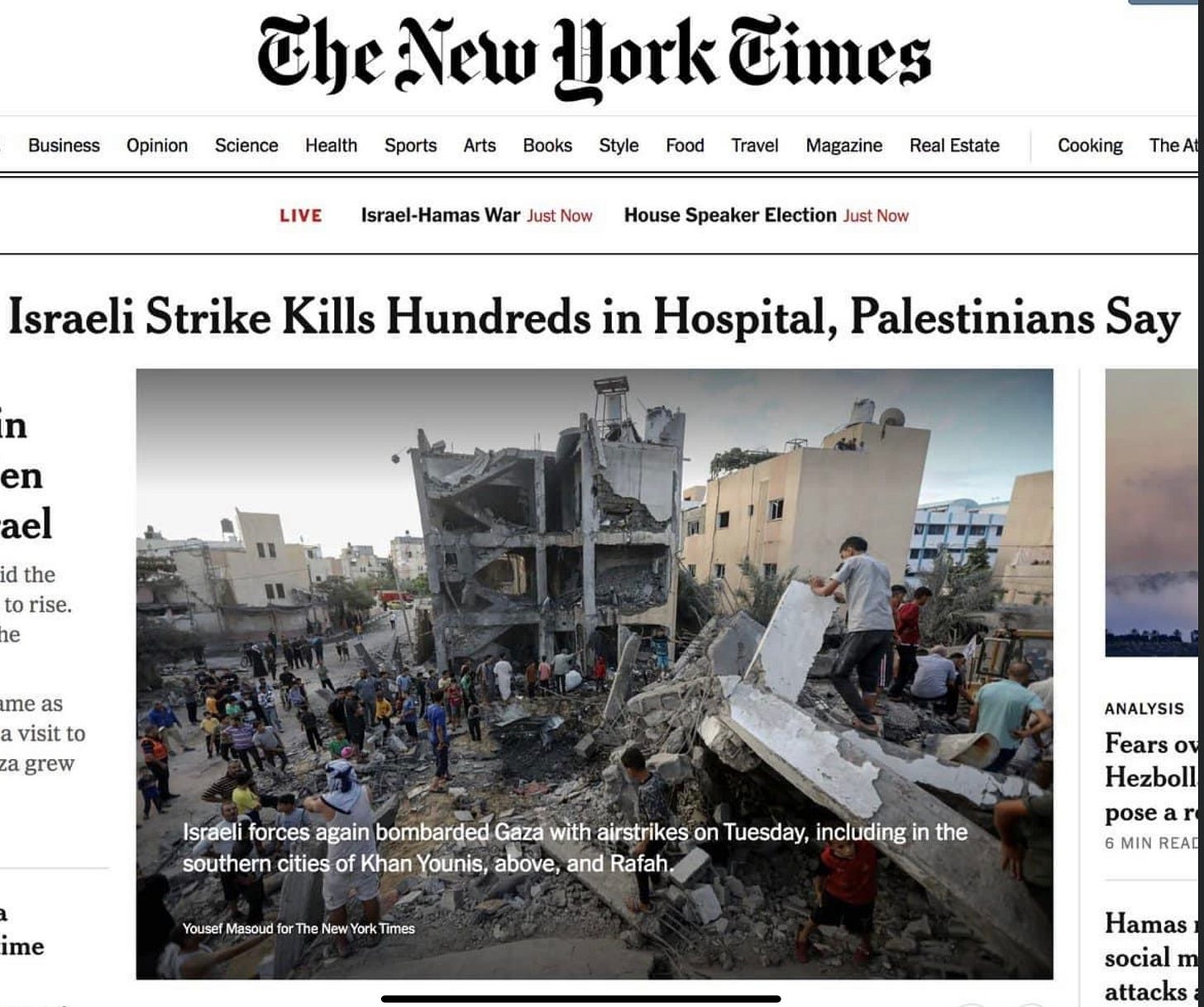
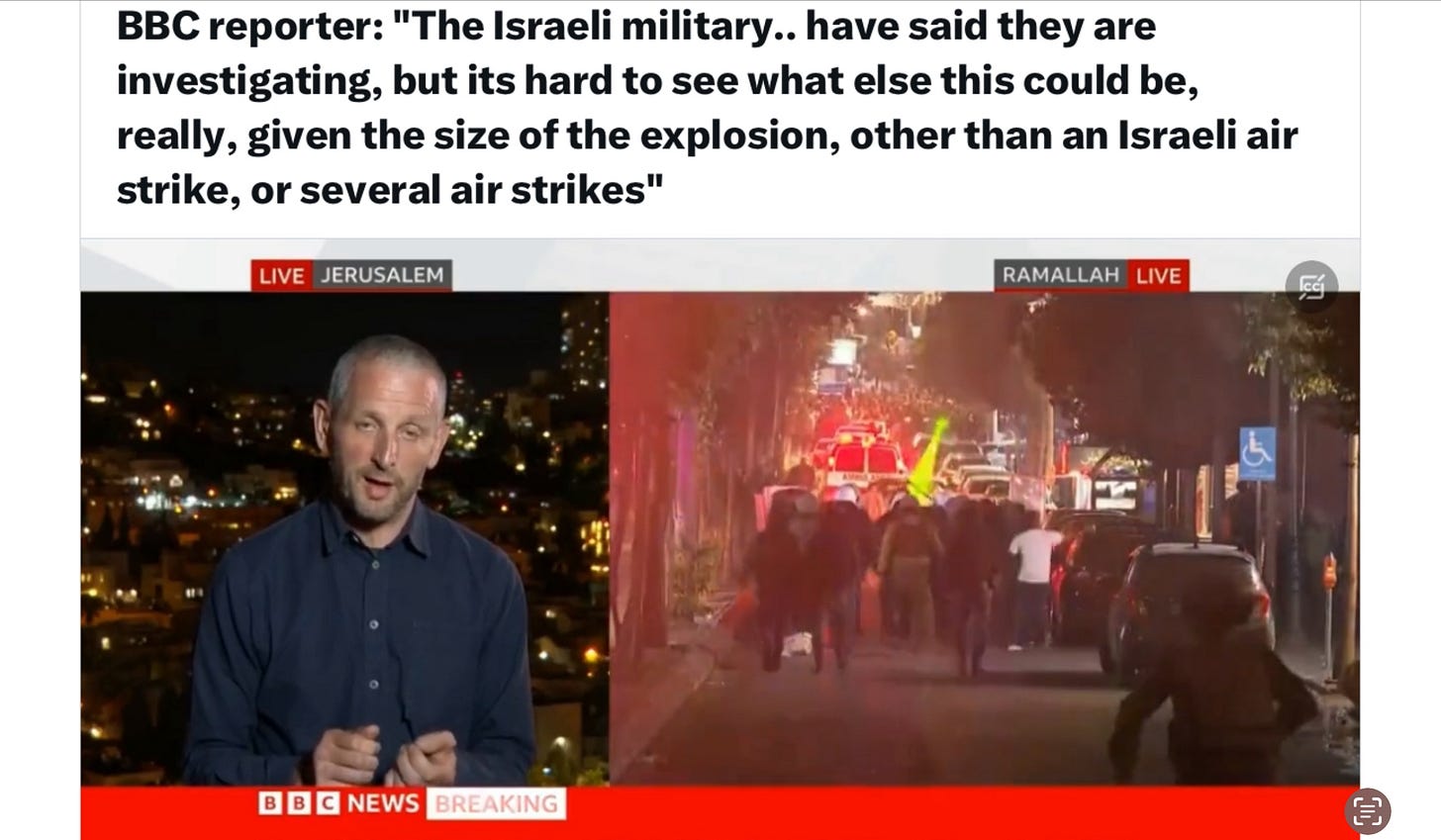
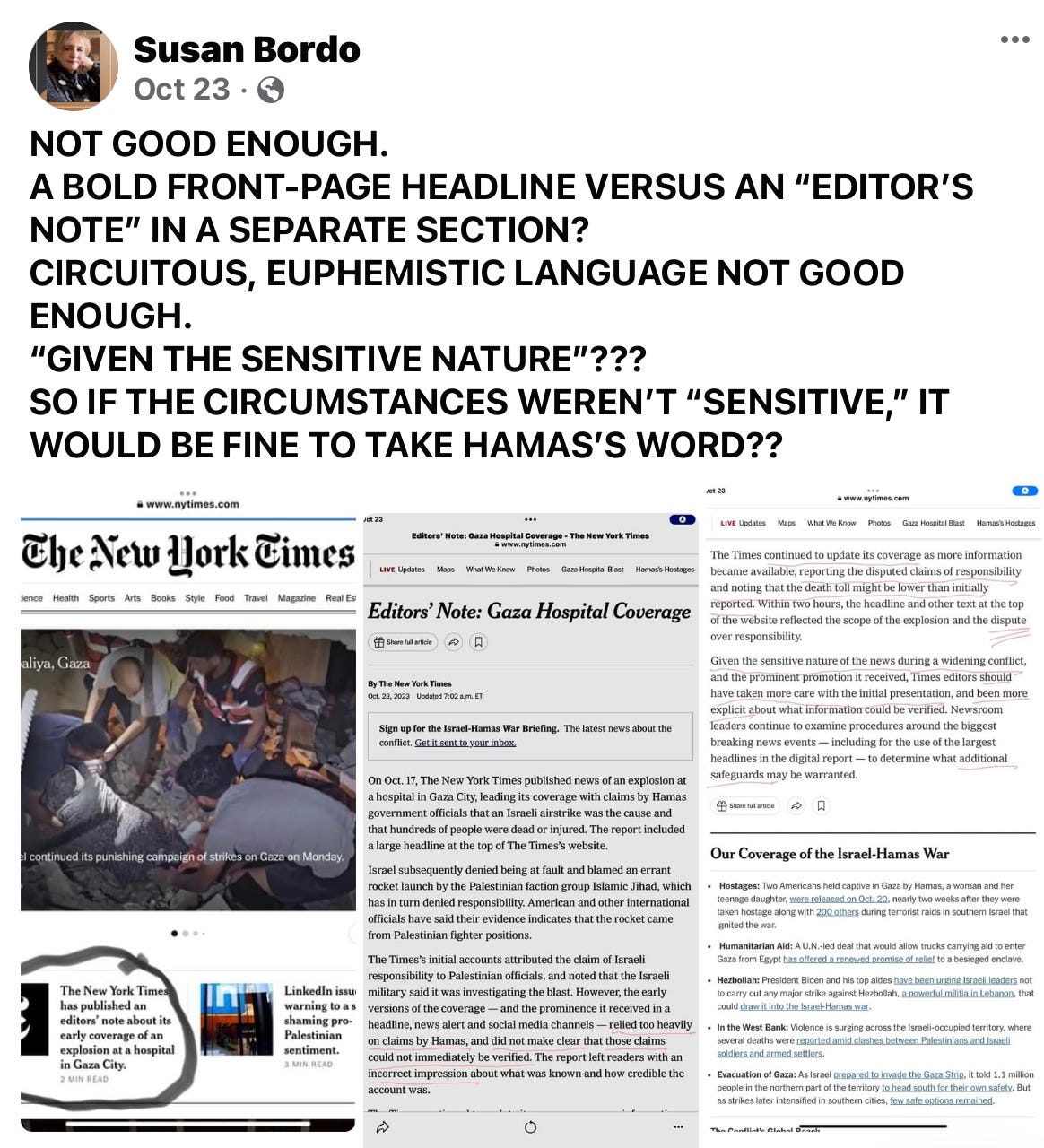
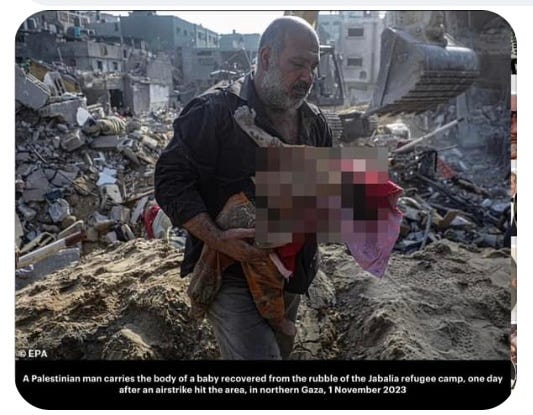


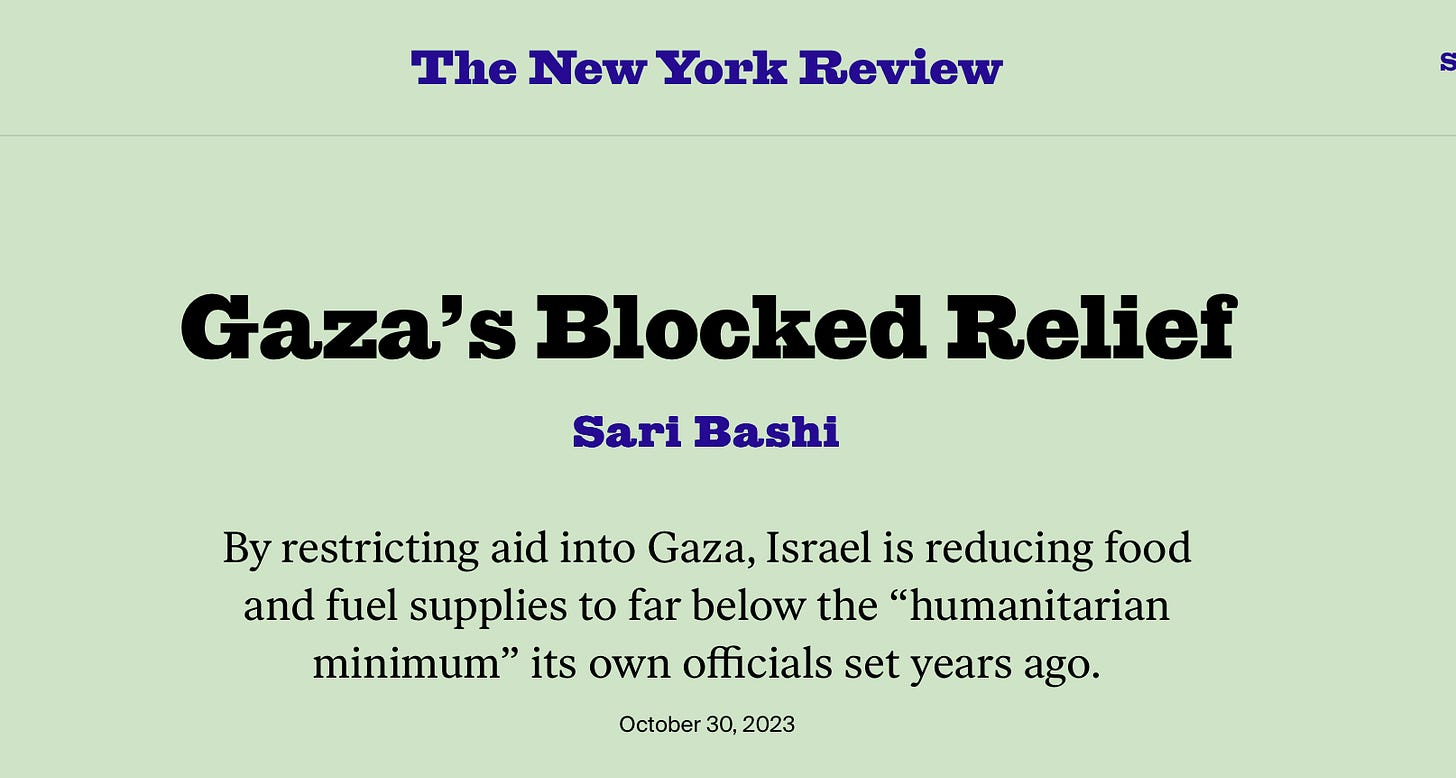



To all you wonderful commenters: I’ve got a bunch of stuff to do today, but will respond as soon as I can. I like the comments section to be a genuine conversation, but sometimes that gets delayed. In the meantime, know I thank you, so, so much!! Some of my writing on subjects like this is hard to do—not research or writing hard, but because of the nature of the content. Your responses keep me going!
This stack "The Media Need to Do Better" is an incredibly important piece, and I've not seen ANYTHING else like it anywhere. It was a relief to keep reading all the details and examples Bordo provides. She has a way of identifying the unease I have felt in the New York Times' reporting about October 7, etc., for example. The comparison to the demonizing of Hillary and empowering of Trump is dead-on. Remember how those absurd and false attributions to Hillary just slid along, poisoning peoples' impressions? It's happening again -- this time about Israel and Jews. I am very grateful for this analysis, and all the work that clearly went into it.